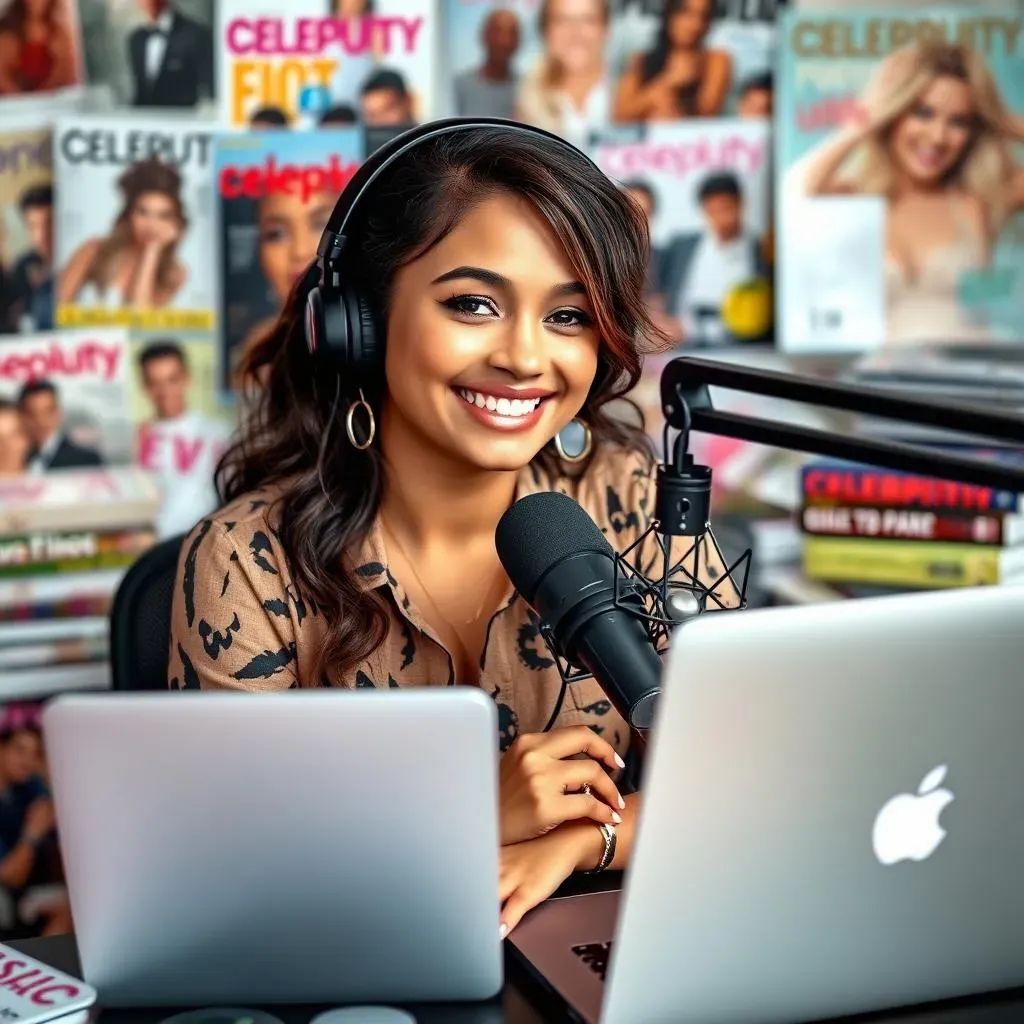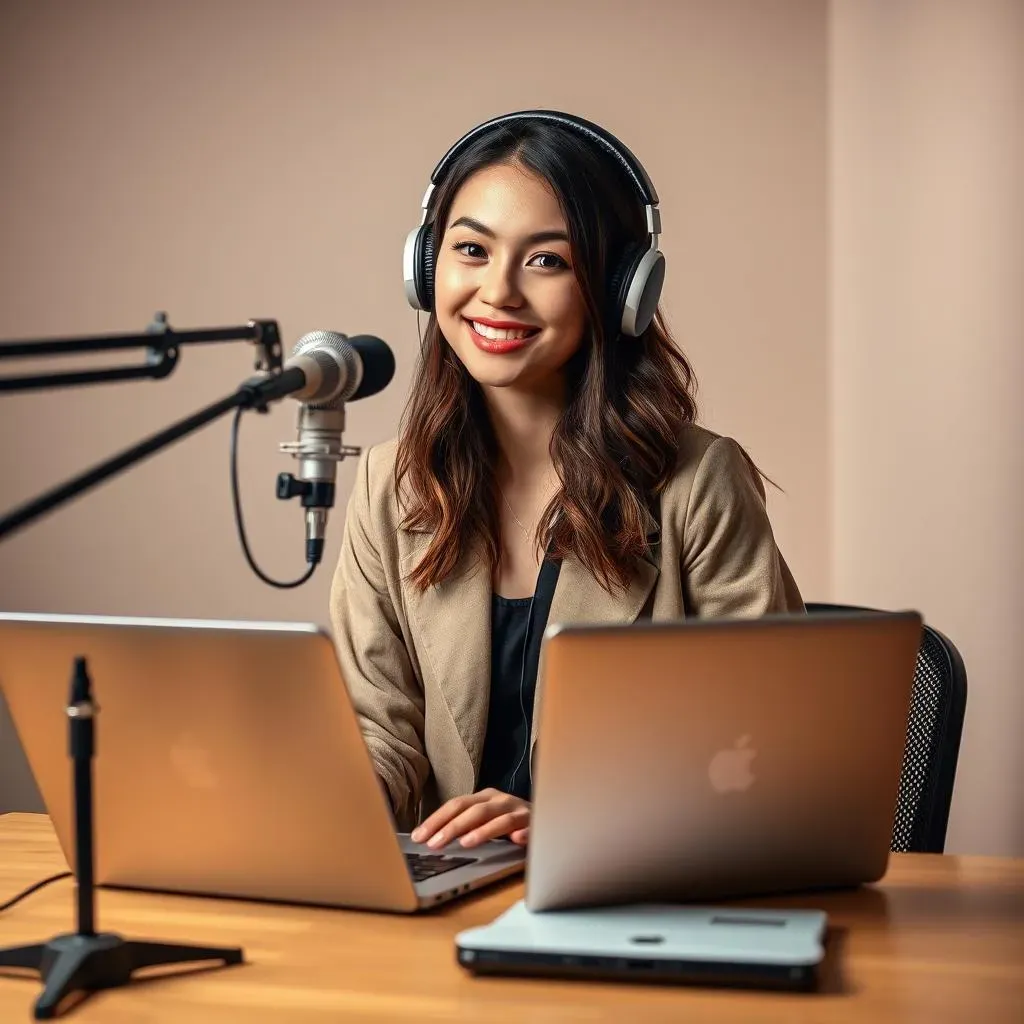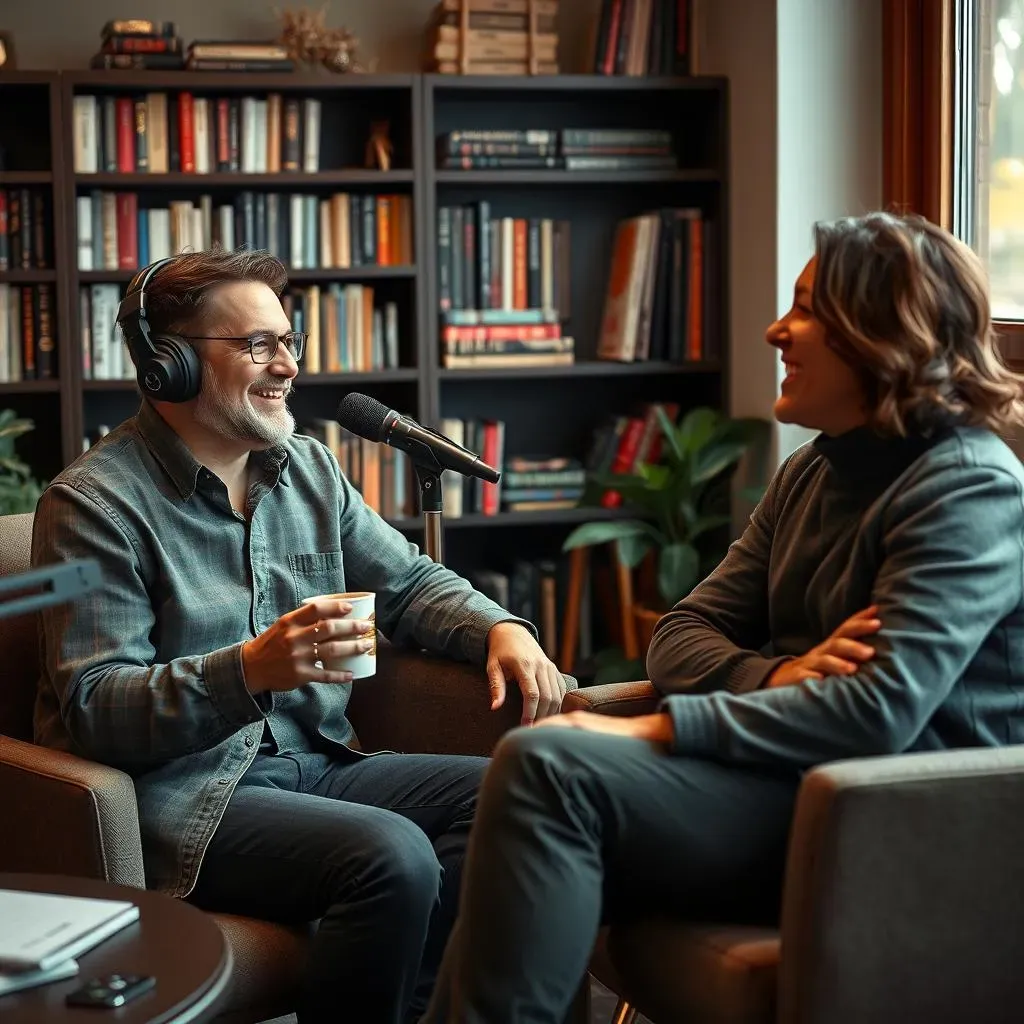Table of Contents
Ever dreamt of chatting with your favorite celebrities? You're not alone! Launching a celebrity-inspired podcast might seem like a far-off fantasy, but with the right approach, it's totally achievable. This article isn't about becoming famous overnight, it's about giving you the real-world tips for starting your own celebrity-inspired podcast. We're going to break it down, from picking the perfect niche and getting your tech sorted, to landing those sought-after interviews and building a loyal audience. Forget the smoke and mirrors; we'll focus on the practical steps you can take right now. We'll explore how to choose a style that suits you, the gear you actually need (no need to break the bank!), and how to make your podcast stand out from the crowd. Get ready to turn your celebrity obsession into an awesome podcasting adventure – let's get started!
Choosing Your Celebrity Niche and Podcast Style

Choosing Your Celebrity Niche and Podcast Style
Finding Your Focus
Okay, so you want a celebrity podcast, that's cool! But "celebrity" is a pretty wide net. Think about what you're actually passionate about. Are you obsessed with reality TV drama? Maybe you're a die-hard fan of classic Hollywood movies? Or perhaps you're all about the latest pop music icons. The more specific you get, the easier it will be to find your audience. Don't try to be everything to everyone, it's a recipe for disaster. Instead, pick a lane and dominate it. For example, instead of "celebrity interviews," maybe you do "interviews with former child stars." See the difference? It's all about that niche.
Podcast Style: Interview, Solo, or a Mix?
Now that you've got your niche, let's talk about the vibe of your show. Will it be a straight-up interview format where you're chatting with guests? Or maybe you're more of a solo act, giving your witty take on celebrity news and gossip. You could even go for a hybrid approach, mixing interviews with solo segments. There's no right or wrong answer, it really depends on your personality and what kind of show you want to create. If you're naturally good at talking and have a lot of opinions, a solo show might be perfect. But if you love the back-and-forth conversation and are a great listener, interviews are your jam. Also, consider the work involved. Solo shows can be a little easier to produce, but interviews rely on others' schedules.
Podcast Style | Pros | Cons |
|---|---|---|
Interview | Engaging conversations, brings in different perspectives | Requires scheduling, may depend on guest availability |
Solo | More control, easier to schedule | Can be harder to keep listeners engaged, may feel one-sided |
Hybrid | Variety, can showcase different strengths | Requires more planning, can be complex to produce |
Online or In-Person?
Finally, think about how you will record your podcast. Will you do it all online with guests joining remotely? Or will you be meeting them in person? Online is obviously more convenient. It lets you interview anyone, anywhere. But in-person can add a unique dynamic. The choice depends on your resources and the kind of vibe you're going for. If you're starting out, online is probably the easiest way to go. You can always move to in-person recordings later if you want. It's all about finding what works best for you and your celebrity-inspired podcast. Don't overthink it, just start somewhere and adjust as you go.
Technical Tips for Starting Your CelebrityInspired Podcast

Technical Tips for Starting Your CelebrityInspired Podcast
The Bare Bones: Essential Equipment
Alright, let's talk tech, but don't freak out; it's not as scary as it sounds. You don't need a fancy studio to start a great podcast. The most crucial thing is having a decent microphone. Seriously, don't use your computer's built-in mic, it's terrible. Invest in a USB microphone, they're pretty affordable and will make a world of difference to your sound quality. Think of it like this: your voice is the star of the show, and a good mic is like a great spotlight that makes it shine. Headphones are also important, you need to hear yourself and your guests clearly to avoid any annoying background noises or echoes. And finally, you'll need some recording software. Audacity is a free option that's easy to use, or you can go for something like GarageBand if you're on a Mac.
I know, I know, it might seem like a lot, but it's really not. Think of it as building your podcasting toolkit. You wouldn't try to build a house without a hammer, right? The same goes for your podcast. Good sound is the foundation of a great listening experience. These basic tools are all you need to get started, and you can always upgrade later as you get more experience and your podcast grows. The goal is to sound clear and professional, even if you're just starting out in your bedroom.
Equipment | Why it's Needed | Budget Option |
|---|---|---|
USB Microphone | Clear audio quality | Fifine K669B |
Headphones | Monitor sound, avoid feedback | Audio-Technica ATH-M20x |
Recording Software | Record and edit audio | Audacity (Free) |
Editing and Sound Quality: The Polish
Okay, so you've recorded your awesome interview, now what? This is where editing comes in. Don't worry, you don't need to be a pro audio engineer. Basic editing is about cleaning up any mistakes, removing long pauses, and making sure the sound levels are consistent. Think of it like polishing a diamond. You're taking the raw material and making it shine. There are tons of tutorials online that can teach you the basics, and it's something you'll get better at with practice. Remember, your goal is to make your podcast sound as professional as possible, even if you're doing it on a shoestring budget.
Sound quality is super important. Nobody wants to listen to a podcast that sounds like it was recorded in a tin can. So, while you are editing, pay attention to the sound levels. Make sure your voice and your guest's voice are at similar volumes. You can use a compressor in your editing software to help with this. Also, try to record in a quiet space with minimal background noise. Even things like a ticking clock or the hum of your computer can be distracting for listeners. Remember, it's all about creating a smooth and enjoyable listening experience. A little effort in editing can go a long way.
Landing Celebrity Guests and Delivering Great Content

Landing Celebrity Guests and Delivering Great Content
Reaching Out to the Stars: Making the Connection
Okay, so you've got your podcast all set up, but how do you actually get celebrities on your show? It's not as impossible as it seems, but it does take some strategy. The first thing you need to do is find the right contact. Don't just send a random DM on Instagram. Most celebrities have a publicist or a manager, and that's who you need to reach out to. You can usually find their contact information on the celebrity's website or social media accounts. When you reach out, keep it short and sweet. Don't send a novel about how awesome your podcast is. Instead, introduce yourself, explain your podcast's focus, and why you think their guest would be a good fit. Be professional, be polite, and most importantly, be persistent. It might take a few tries to get a response, but don't give up.
Think of it like you're applying for a job. You wouldn't just send a generic resume to every company, right? You'd tailor it to each specific position. The same goes for reaching out to celebrities. Research them, understand their brand, and explain how being on your podcast will benefit them. Maybe they have a new project they're promoting, or maybe your audience aligns with their interests. Make it a win-win for both of you. It's also helpful to start small. You might not land a huge A-lister right away, but you can build up your credibility by interviewing smaller celebrities or experts in your niche. Once you've got a few great interviews under your belt, it'll be easier to attract bigger names.
Crafting Engaging Interviews: More Than Just Questions
Alright, you've landed a celebrity guest, congrats! Now the real fun begins: the actual interview. This isn't just about asking a list of questions you found online. It's about having a real conversation and creating a connection with your guest. Do your research! Know their background, their work, and what they're passionate about. This will help you ask thoughtful and engaging questions. And don't be afraid to go off-script. Some of the best moments in interviews happen when you're just having a genuine chat. Be a good listener. Pay attention to what your guest is saying, and be ready to follow up on interesting points.
Think of your interview like a story. You're the storyteller, and your guest is the main character. It's your job to guide the conversation and bring out the best in them. Don't interrupt, be respectful, and let them shine. Also, remember that your audience is listening too. Make sure the interview is interesting and informative for them. Don't just ask questions that will benefit you. Think about what your listeners want to hear and what they will find valuable. And most importantly, have fun! If you're enjoying the conversation, your audience will too. It's all about creating a great experience for everyone involved.
Interview Tip | Description |
|---|---|
Research | Know your guest's background and interests. |
Listen | Pay attention and follow up on interesting points. |
Be Authentic | Have a real conversation, don't just read questions. |
Engage | Make it interesting for both the guest and the audience. |
Tips for Starting Your Own CelebrityInspired Podcast: Distribution & Monetization

Tips for Starting Your Own CelebrityInspired Podcast: Distribution & Monetization
Getting Your Podcast Heard: Distribution Strategies
Okay, you've got killer content, now it's time to get it out there. It's like having the best pizza in town, but nobody knows you exist! You need to be strategic about distribution. First off, make sure your podcast is listed on all the major platforms: Apple Podcasts, Spotify, Google Podcasts, the works. Think of these as your main storefronts. They're where most people discover new podcasts. But don't just stop there. You need to be your own hype man (or woman!). Share teasers of your episodes on social media. Create eye-catching graphics and engaging captions. It's all about sparking curiosity and getting people to click that play button. Remember, consistency is key. Post regularly and engage with your audience. The more you put yourself out there, the more people will find you.
Another great tactic is collaborating with other podcasts. Find shows that are similar to yours and see if you can do a cross-promotion. Maybe you can even be a guest on their show, and they can be a guest on yours. It's like a podcasting partnership! It's a great way to expose your show to a new audience. Also, don't be afraid to plug your podcast on other platforms. If you are a guest on another podcast, make sure to mention your own. If you're doing a public speaking event, mention your podcast. The more you talk about it, the more people will discover it. It's about creating a buzz and getting people excited about what you're doing.
Distribution Tactic | Description |
|---|---|
Major Platforms | List your podcast on Apple, Spotify, Google, etc. |
Social Media | Share teasers and engage with your audience. |
Collaborations | Cross-promote with other podcasts. |
Making Some Dough: Monetization Options
Let's talk about the fun stuff: making money! While it shouldn't be your primary focus when you're starting out, it's definitely something to consider. There are several ways you can monetize your podcast. The most common is through sponsorships. Once you've built up a decent audience, companies will start reaching out to you to promote their products or services on your show. It's like having a commercial break, but you get to choose the brands that align with your values. Another option is to create a membership program. You can offer exclusive content, bonus episodes, or even Q&A sessions with your guests. It's a great way to create a loyal community and generate a recurring income.
You can also use your podcast to market your own products or services. If you're a coach, a consultant, or an author, your podcast can be a great way to attract new clients. It's like having a free marketing platform. And finally, don't forget about merchandise! You can create custom t-shirts, mugs, or other products with your podcast logo and sell them to your fans. It's a fun way to generate some extra income and build your brand. Remember, the key to successful monetization is to focus on creating valuable content that your audience loves. The more value you provide, the more likely people will be to support you. It's like a win-win for everyone!
The Long Game: Patience and Persistence
Starting a podcast is a marathon, not a sprint. It takes time to build an audience, land big-name guests, and start making money. Don't get discouraged if you don't see results right away. It's all about consistency and persistence. Keep creating great content, keep promoting your show, and keep engaging with your audience. The more you put into it, the more you'll get out of it. And most importantly, have fun! If you're not enjoying the process, it's going to be hard to stay motivated. So find a niche you're passionate about, land guests you admire, and create a podcast that you're proud of. The rest will follow.